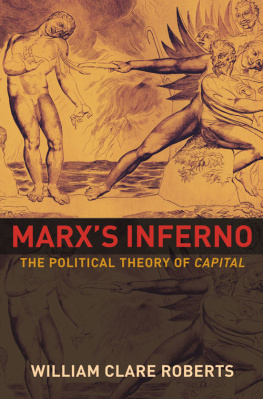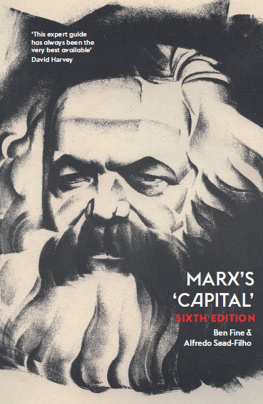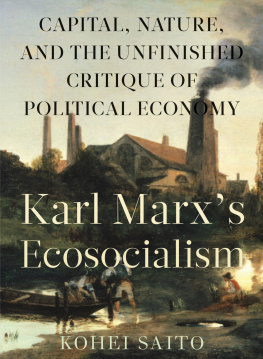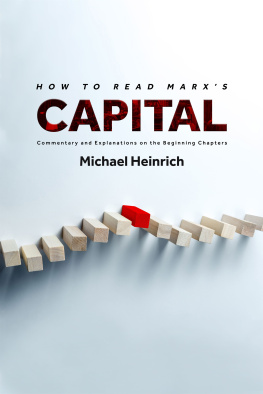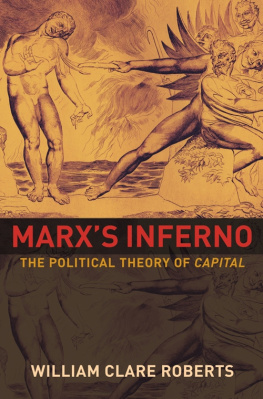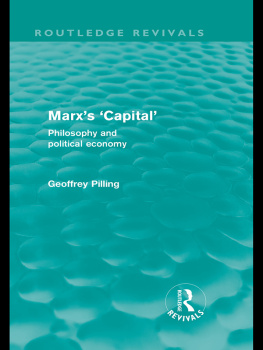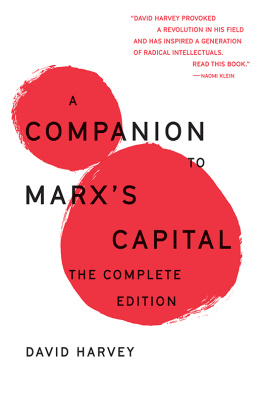Marxs Inferno

Marxs Inferno

THE POLITICAL THEORY OF CAPITAL
William Clare Roberts
PRINCETON UNIVERSITY PRESS
PRINCETON AND OXFORD
Copyright 2017 by Princeton University Press
Published by Princeton University Press, 41 William Street, Princeton, New Jersey 08540
In the United Kingdom: Princeton University Press, 6 Oxford Street, Woodstock, Oxfordshire OX20 1TR
press.princeton.edu
Jacket art: William Blake, The Demons Tormenting Ceampolo, from the illustrated Divine Comedy, Canto XXII, 1824. Lebrecht Music and Arts Photo Library / Alamy.
All Rights Reserved
Library of Congress Cataloging-in-Publication Data
Names: Roberts, William Clare, 1974 author.
Title: Marxs Inferno : the political theory of Capital / William Clare Roberts.
Description: Princeton : Princeton University Press, [2017] | Includes bibliographical references and index.
Identifiers: LCCN 2016012489 | ISBN 9780691172903 (hardcover : alk. paper)
Subjects: LCSH: Marx, Karl, 18181883. Kapital. | Dante Alighieri, 12651321. Inferno. | CapitalismPolitical aspects.
Classification: LCC HB501.M37 R595 2017 | DDC 335.4/12dc23
LC record available at https://lccn.loc.gov/2016012489
British Library Cataloging-in-Publication Data is available
This book has been composed in Sabon LT Std
Printed on acid-free paper.
Printed in the United States of America
1 3 5 7 9 10 8 6 4 2
Dedicated to H., my ever-present future,
and to the memory of my father, Joe,
who should have lived to see this.

Contents

Acknowledgments

I am not so much the parent of these thoughts and arguments as I am their child. And I have had many midwives, who have, through their engagement, criticism, conspiracy, and nourishment, assisted in my birth.
I first noticed and began to ask questions about Marxs Dante citations in a reading group led by Dan Conway and made incredibly stimulating by the participation of Hasana Sharp and Mike Schleeter. My mentor, Dan, always emboldened my outlandish thoughts. He also put me into contact with Terrell Carver and John Seery, whose attention to the political, rhetorical, and literary complications of Marxs texts pointed me in the right direction, and who have continued to provoke, support, and sustain my research ever since.
My colleagues at McGill University, in both the Department of Political Science and the Research Group on Constitutional Studies, have created an ideal environment for working on this book. They are generous with their time and interest, open and curious interlocutors, and perceptive and always-helpful readers and commenters. My argument and scholarship are much stronger for their inspiration, example, and support. In particular, I would thank Arash Abizadeh, Phil Buckley, Jacob Levy, Catherine Lu, Hudson Meadwell, Victor Muiz-Fraticelli, Hasana Sharp, Christina Tarnopolsky, Tim Waligore, and Yves Winter.
Numerous students have participated, in one way or another, in the writing of this book. Without downplaying the contributions of others, I would single out several for special mention: Kristin Li, Tara Myketiak, Cameron Fleming, Cameron Cotton-OBrien, and Chris Brzovic have all discussed the book project with me at length. The students from my first seminar on republicanism and my topics course on Marx and Proudhon listened patiently to my crazy ramblings and offered a wealth of questions and comments. Three students have provided me especially valuable research assistance. Lola Duffort was particularly helpful when I was wrestling with Proudhon, and she generously corrected my French. Jake Bleiberg helped immensely with the initial research, bringing much-needed interest, skepticism, and curiosity to the project. Kyle Jacques was indefatigable and, frankly, invaluable; without his intelligent and apt assistance, the research and writing would have taken twice as long and been half as good. In addition, Eric Tweel and Nicholas Dunn helped in the final stages of manuscript preparation.
Much of my research was undertaken with the support of a grant from the Fonds de recherch du QuebecSociet et culture. Much of the writing was done while I was a visiting research fellow at CRUM, the Centre de recherche en thique de lUniversit de Montral. I must thank especially Christine Tappolet, Peter Dietsch, andabove allValry Giroux for making my time there so productive. Lawrence & Wishart have generously allowed me to reproduce extracts from their fifty-volume edition of the collected works of Marx and Engels (London: Lawrence & Wishart, 19702005).
Early versions of several chapters were delivered as talks at the American Political Science Association, the Association for Political Theory, the Groupe de recherche interuniversitaire en philosophie politique, the University of Alberta, and the Centre de recherche en thique de lUniversit de Montral. Many thanks to those who listened and questioned.
Several people read the entire manuscript and offered their intelligent and well-informed criticism, challenges, commentary, and advice, without which this would be a far-inferior book, if it were a book at all. Gregory Claeys, John Seery, Peter Dietsch, Pablo Gilabert, and Gavin Walker contributed to an all-day workshop on the manuscript, which tempered and sharpened every aspect of the argument. Jacob Levy, Yves Winter, Arash Abizadeh, Hasana Sharp, Catherine Lu, and Victor Muiz-Fraticelli all took time out of their schedules to attend the workshop and offer their comments, as well. I am forever in their debt. Thanks also to Bruno Leipold, Ethan Sawyer, and Niko Block for their comments and suggestions. Sam Chambers read an early version of the manuscript and gave copious and perceptive feedback, as well as much-needed encouragement and advice.
Special thanks are due to Jacob Levy, who has championed me and my work since 2007. He has been an invaluable mentor and senior colleague, and he is, perhaps, the most fair-minded person I have ever known. We may be on opposing sides, politically and theoretically, but he is the sort of opponent everyone ought to wish for, the sort whose intelligence and virtue compel one to become better in order not to concede defeat.
I also owe an especially profound debt to four people who read not only the whole manuscript, but multiple drafts of individual chapters, providing ongoing, intelligent, and well-informed conversation about the argument of my book, the texts of Marx, and the larger issues broached by both. Yves Winter has often disagreed, but has always pushed me to clarify and extend my argument, and has been a real friend and fabulous colleague throughout this writing process. Alex Gourevitch, whose own work on labor republicanism in the American context was a revelation to me, has been, for two and a half years, a rich source of provocation, inspiration, and reassurance. Gavin Walker has been a constant comrade in every sense of the word; he has offered incisive criticism, historical and political reality checks, a peerless knowledge of Marxs texts, and countless hours of beer-fueled conversation, commiseration, and debate. Hasana Sharp has been there from before the beginning, full of curiosity, skepticism, interest, insight, and exemplary judgment; I have not always taken her advice, but I have usually regretted such foolishness sooner or later.
My experience with Princeton University Press has been so uniformly pleasant as to seem a bit unreal. This is due, no doubt, to the expertise of my editor, Rob Tempio, and the team assisting him (I should mention, especially, Nathan Carr, Ryan Mulligan, and my copyeditor, Dawn Hall). My thanks go, also, to the two referees who recommended my manuscript for publication. One of these has subsequently revealed himself to be Corey Robin; his enthusiasm and commentary have been a godsend.
Next page
